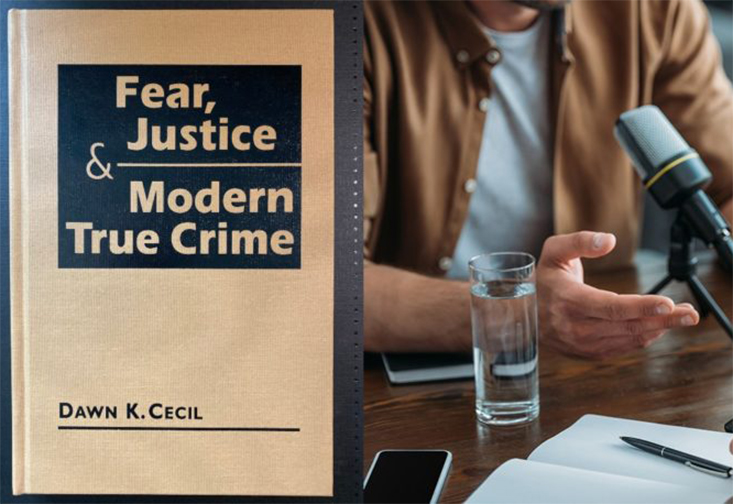When criminology professor Dawn Cecil started researching the true crime podcast Serial about five years ago, she didn’t anticipate meeting one of the officers who discovered the murder at the heart of the first season. But at the 2017 American Society of Criminology Conference in Washington DC, a man approached Cecil with a troubled expression as she was presenting her research on Serial, the cultural sensation that explored the 1999 murder of a high school student and questioned the conviction of her boyfriend.
“It turned out he was a police officer who was there when they found the body of the victim,” Cecil said. “He was very upset about how the podcast portrayed law enforcement and the negative impact the series was having on the victim’s family.”
Cecil became fascinated by questions about the effects of the modern true crime genre – on victims, the accused and society at large. Three years later, she has published a book exploring those questions.
From documentaries and podcasts to Facebook groups and events such as CrimeCon, “Fear, Justice, and Modern True Crime” examines the current wave of true-crime televised series and podcasts to uncover their underlying messages about crime and justice, and to determine the role these popular genres play in society.
The book began as a personal pursuit for Cecil, who teaches courses on crime, media and pop culture at USF’s St. Petersburg campus. Always on the look out for how crime and prisons are depicted in popular culture, Cecil – like millions of other listeners – was drawn to Serial for the way the series seemed to unravel what was otherwise a closed case. After reviewing other true crime podcasts, Cecil recognized that the genre was changing and set out researching for the book.
In “Fear, Justice, and Modern True Crime,” Cecil explores three key questions related to modern true crime: How is the criminal justice system represented in these programs? What impact do these programs have on the criminal justice system? And what ethical implications emerge in the production and consumption of these programs?
What she found was an overwhelming focus on violence and an emphasis on crimes involving white victims for white audiences.
“Even though murder is one of the least common crimes in our society, most modern true crime stories start with murder cases,” Cecil said. “There are beginning to be more shows on white collar crimes and sexual assault, but the majority of these stories focus on murder and missing persons.”
“These stories also overwhelmingly give us cases featuring white offenders and white victims,” she said, referring to what’s sometimes called ‘missing white woman syndrome.’ “There are a lot of missing people from minority groups that we just don’t hear about. The problem is, this gives the false impression that certain missing people don’t deserve our attention.”
In examining the impact of true crime programs on the criminal justice system, Cecil uncovered a complicated relationship between producers, criminal investigators, victims and the accused. While some programs, such as Serial, have led to new developments in the cases they cover, Cecil found instances in which producers wasted law enforcement resources or forced victims’ families to relive their grief.
“In many of these cases, you have people, many of whom have no training in criminal justice or even investigative journalism, trying to solve cold cases,” she said. “This raises a number of ethical concerns.”
Cecil has studied crime and criminals in the media for nearly two decades. Her 2015 book “Prison Life in Popular Culture: From the Big House to Orange is the New Black,” examined depictions of prisons and prisoners in pop culture. Despite her experience, Cecil said working on her recent book had an unexpected impact on her well-being and she encouraged fans of modern true crime to be cautious about its impact on themselves as well.
“I’ve been studying the criminal justice system for a very long time, but analyzing murder stories for two years had a negative impact on me,” she said. “I wrote in the book about how it impacted my mood and made me scared of things I usually wouldn’t be.”
To cope with the gravity of her research, Cecil said she picked up a new hobby, roller skating, and found it to be a positive form of self care, allowing her to keep her mind off the grim details of the stories she was analyzing.
“You can’t think about true crime while you’re roller skating and trying not to fall,” she joked. “You need to use 100 percent of your brain for that.”
